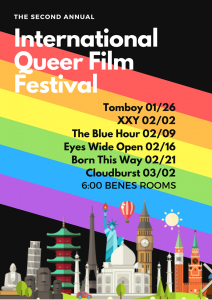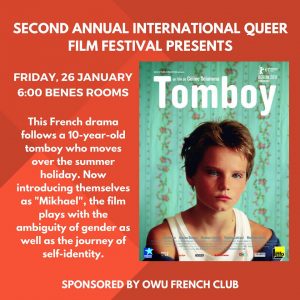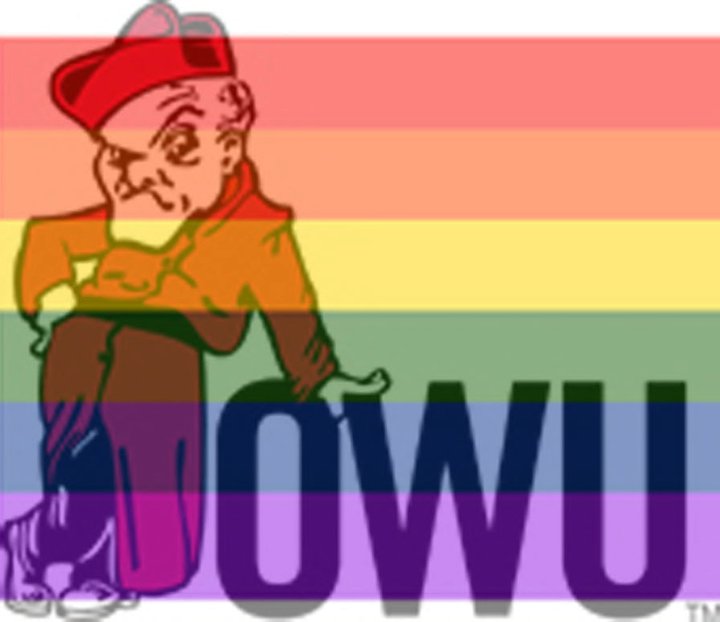The International Queer Film Festival (IQFF) is a yearly event created and coordinated by OWU students and focusing on equal representation for people of all gender and sexuality identities all around the world. It is sponsored by OWU’s Ross Art Museum, Wesleyan Council on Student Affairs (WCSA), People Regarding Individual Diversity Everywhere (PRIDE), Spectrum Resource Center, French Club and Horizons International.
The IQFF just finished its second year, pulling in even bigger crowds than last year and screening films from Israel, Canada, Cameroon, Thailand, Argentina and France. The Sturges Script interviewed the co-chairs of the festival, Ryan Bishop ’17 and Jason Perry ’18
So, who are you, and what do you do?
Ryan: My name is Ryan Zlatanova, or Ryan Bishop, and I graduated from OWU in December 2017 with a degree in Zoology and a minor in East Asian Studies. I currently work as an environmental education intern at Stratford Ecological Center, and am finding my way as an activist outside of college.
Jason: I’m a senior math major and, especially earlier in college, was committed to working on a variety of activist projects on campus.

What was the motivation to create the IQFF?
Ryan: It was a frustration for me as a queer person, seeing only the same cliché straight romance in film and TV, time after time. All these films somehow found a way to shove an unnecessary straight romance into the plot. Even when it wasn’t a cliché romance, it started to hurt my heart that it wasn’t a queer couple getting their story televised; it wasn’t a queer couple getting a complex plotline and a happy ending. I guess in short, I wanted to see myself on screen and I wanted to see more stories about my fellow queer folks on screen. And not just the mainstream queer narratives of skinny white American men, but queer stories from around the world. IQFF was created to bring OWU’s queer community together for an event where we can see our stories on screen, and share them with the broader campus community.
Jason: The idea was all Ryan’s, but he and I are close friends, and he asked me if I’d like to work with him on it. The mission of IQFF is an important one – but there are hundreds of well motivated project ideas generated every year on campus.
Who have you partnered with (this year and last year) to create the IQFF?
Ryan: Last year, all organization was done by myself, Jason and Meme Salazar Rodriguez ’17. This year we recruited a team of wonderful volunteers who we hope will continue leading the project in the future: Anna Burkhart (who created this year’s poster, shown above), Becca Porter, Isabelle Ammendola, Brandon Stevens, Mahnoor Ansari and Emily Shpiece.
How does the IQFF relate to your academic pursuits and social interests?
Ryan: The IQFF embodies part of my social justice activism and my pride in being a member of the queer community.
Jason: I chose to work on IQFF because it seemed the right size that we could actually get it off the ground in a meaningful way. It’s a project that has a good blend of humble (“if we get a few people to show up to see our gay movie—that we also get to watch—that’s a win”) and grand (“showing queer cinema is central to giving members of the LGBT+ community a stronger sense of place/belonging in our society and helps ‘normalize’ LGBT+ narratives”). Tied in with the prior point, this is a project that’s success is in directly engaging students, which feels more tangible and achievable than larger institutional change; it’s a project I had to the tool kit and skills to contribute to in a consequential way.
What was the biggest challenge of creating the IQFF?
Ryan: Last year – just doing it all on our own. Figuring out all of the logistics, from how to best advertise, to how to make sure we can get the funding we need. So much thinking goes into IQFF’s organization. Jason and I spent numerous hours just brainstorming strategies about audience pull, about how to engage professors and their classes or exactly what kind of movies we are looking to show and how to best balance them. We had no experience organizing an event on this scale, so figuring it all out on our own to make it look professional was grueling.
What’s been your favorite part of being involved in the IQFF?
Ryan: Finding all of these amazing queer movies and sharing them with campus. Watching them with everyone and thinking “Wow…here we have a room full of people, queer and not, who came just to see this movie about queer people, like how they watch any other movie.” The process of picking films itself is so much fun, we go through so many choices (our masterlist had over 100 films).
Jason: Hanging out with Ryan and the rest of the IQFF team, watching some great movies (particularly films about forms of life radically different from my own, like our films about religious communities) and staying immersed in the conversations of the LGBT+ community which can be easy to lose touch with if I’m not proactive.
How do you hope the IQFF changes shape and grows next year?
Ryan: I hope the team has a chance to start working earlier and make the events even better, with merchandise and more support from the University and other groups. I hope we can increase our attendance too, even from this year. Maybe we can pull more community members!
What lessons do you hope people take from this year’s IQFF?
Ryan: Queer stories make for incredible cinema in a variety of genres. They deserve to be told.
How has this year’s IQFF evolved and significantly changed from last year’s?
Ryan: Our advertising strategy shifted a lot by putting great emphasis on soliciting professor support in faculty giving extra credit to their students for attending our films.

For their first film screening, the IQFF partnered with Allons-y!, OWU’s French Club.
Jason: Ryan and I had a team this year; this totally changed how ambitious we could be. We had a stronger set of skills for marketing, knew who to talk to, knew how to get things done, planned ahead and started earlier and had greater legitimacy and recognition with faculty.
How has your involvement with the IQFF impacted what you want to do with your life?
Ryan: It showed me that event planning is a really fun process that I am good at and that can be useful in unexpected ways in my field.
Jason: There was a brief moment where my never-going-to-happen dream job was to be a movie critic. This would be, of course, a bizarre choice for a math major who lacks any serious background in cinema and has written a total of two papers since my sophomore year. I’ve been appropriately ridded of this idea a while ago. More seriously: The two most important elements have probably been the constant conversations about LGBT+ life in other countries/geographic communities, and I’ve learned tremendous amounts about how to effectively organize and advertise. At times, it’s felt like what I imagine running a small business must feel like.

